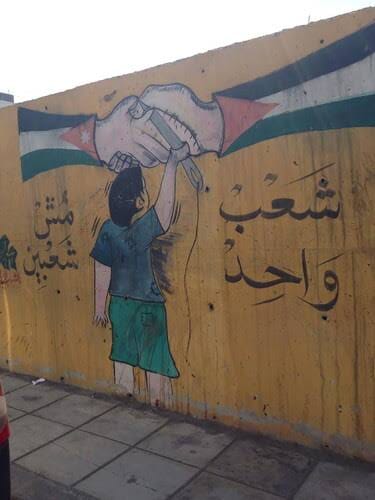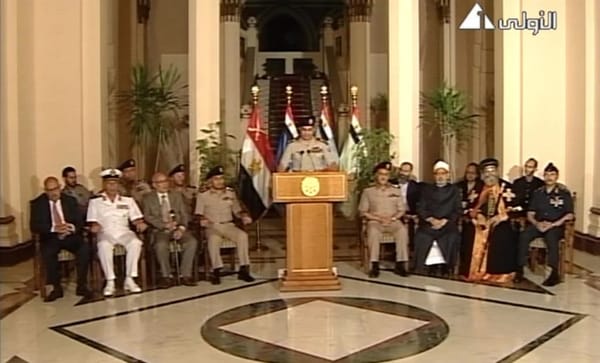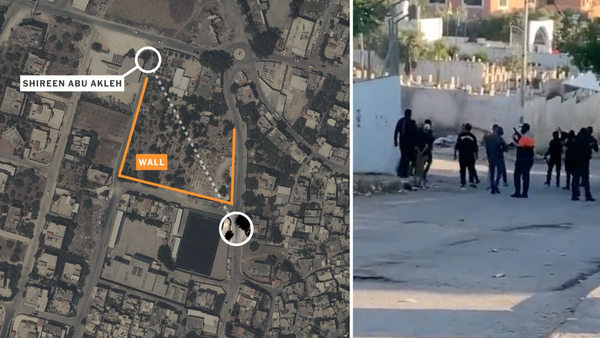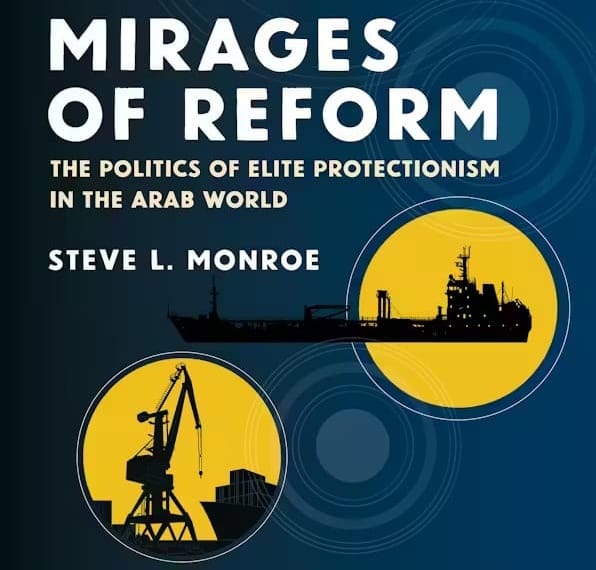How are women represented in Arab parliaments?

An important new book offers surprising answers. That, plus a call for papers on Syria and this week's roundup of new journal articles!
As promised, we're back this week with a full MENA Academy roundup – including not only journal articles but also a return to our old tradition of book review essays. Before we get to that, though, I'd like to draw your attention to a timely opportunity for those of you work on Syria – a virtual POMEPS workshop on Syria's post-Asad transition to be held in mid-September. The deadline is fast approaching on Monday, July 21, so definitely get a proposal in if you're interested. The workshop is being convened and organized by POMEPS steering committee members Andre Bank, Wendy Pearlman, Lama Mourad and me, in partnership with Ahmed Morsy and the great team at the Arab Political Science Network. We are especially interested in proposals from early career scholars, scholars from the MENA region, and especially Syrian scholars – but are also very open to contributions from later career (don't say "older") scholars or from scholars bringing to bear a comparative perspective. Here's the call for proposals:
The stunning collapse of the Assad regime in December 2024 has thrown up crucial questions about the future of Syria and the Syrian people. For example, is Syria transitioning mainly from fourteen years of internationalized war or is it also experiencing a transition from more than a half-century of authoritarianism toward a more representative and participatory political system? How can we understand key decisions from Syria’s new rulers thus far and how they will affect the trajectory of this transition? What should we be looking for to understand dynamics related to economic recovery and reconstruction; refugee return and restitution; legal, education, and security sector reform; and transitional justice, accountability, and national reconciliation, among other essential political processes? What impacts are different societal actors, including civil society and diaspora organizations, having on the ground? How will media, social media, and diverse narratives influence how Syria’s diverse citizens grapple with the past, make sense of the present, and imagine their aspirations for the next phase? What are the roles of regional and international actors in shaping post-Assad Syria and its place in the broader Middle East? What theories, concepts, and findings from other cases of post-conflict and post-authoritarian transitions are useful for understanding Syria’s next chapter?
We seek papers on these and any topic of relevance for understanding Syria today. Papers should be 2,000-3000 words and will be presented and discussed in a virtual workshop on September 19, 2025. Papers will subsequently be revised and published in an open access POMEPS Studies volume, aiming for a launch around the first anniversary of the fall of the regime in December 2025. To apply, please complete this Google Form. Please include your CV and an abstract of no more than 500 words. The deadline to apply is July 21, 2025. We especially welcome applications from scholars from the MENA region and early-career scholars.
And Now: The Return of the MENA Academy Book Review Essay
Marwa Shalaby, Varieties of Power: Women's Political Representation in Arab Parliaments (Columbia University Press, 2025).
Women have been elected to parliaments in a wide range of Arab countries over the years - through electoral quotas, through individual resources and reputation, through political party strategies. But how significant has their representation in elected bodies really been? Most Arab parliaments are generally understood to have little real independent power, and within those parliaments many people assume that women are their as tokens (or as showpieces to prove 'moderation' to Western donors and politicians).
Marwa Shalaby's sweeping new book, Varieties of Power: Women's Political Representation in Arab Parliaments (just published in my Columbia University Press series Columbia Studies in Middle East Politics), delivers an exceptionally robust empirical and theoretical examination of those assumptions. Focusing on Jordan, Morocco and Kuwait - but with much broader theoretical and comparative ambitions – Varieties of Power sets out to theorize and test the influence of Arab women parliamentarians across different systems and contexts. To do so, Shalaby has constructed a unique and authoritative dataset on the membership, leadership, and legislative activities of Arab parliaments, and extensive secondary datasets and mixed-method research focused specifically on female parliamentarians. The book's rich empirics and confident theoretical advances represent the fruits of a long-running research programme. Shalaby has been at the forefront of an important cohort of scholars who have been using new data sources such as parliamentary questions and evolving methods such as surveys designed to elicit the degree of bias for or against female electoral candidates. Her book shows the fruits of that broader research programme while making very distinctive new contributions.
While those datasets offer extremely useful and novel evidence about the numerical/descriptive representation of women in those parliaments, Shalaby goes beyond representation to examine the degree of substantive representation and power those women have been able to wield. Along the way, she reorients the debate on some of the most widely studied aspects of women in formal politics in the Arab world – the effects of electoral quota systems; the role of party organizations in promoting, exploiting, or inhibiting women members; the distinctive approach of Islamist movements to both their own female parliamentarians and those from other parties. She shows that women from more institutionalized parties – including Islamist parties – are more likely to gain leadership positions such as committee chairmanships. She also shows through detailed and quite unique empirical research that female MPs aren't much more likely than their male counterparts to focus on "women's issues" – but they are more likely to issue queries on education and health.
Varieties of Power should be of wide interest across political science. It of course makes a critically important, authoritative and timely intervention in the emerging literature on gender and politics in the Middle East. It also represents the state of the art in the study of Arab parliaments, which play more of a role in many political systems than simple codings as non-democracies might suggest.
Around the Journals
By pure coincidence, this week's roundup includes not one but two articles co-authored by Marwa Shalaby, one on the political preferences of ordinary Tunisians during the transition and the other on the effects of parliamentary responsiveness on protest activity in Algeria. We conclude with two great pieces on Turkey: an exceptionally original and just downright fascinating Lisel Hintz article on the politics of cooking shows on Turkish television; and an important, deeply informed policy-oriented piece on how to fight Turkey's surging authoritarianism by top Turkey scholars Berk Esen and Sebnem Gumuscu. We then feature two highly original articles on Jordan: Matthew Lacouture on the uneven patterns of hegemony and resistance in neoliberal Jordan, and Astrid Bourlond on the effectiveness and unexpected results of Jordan's imposition of a single unified mosque sermon across the country as a form of political control. We also have a new study of the ideological evolution of Tunisia's Ennahda from 2011-2018; a deeply researched and important study of the effects of civilian harm on military legitimacy in Mosul by Benjamin Krick, Jonathan Petkun, and Mara Revkin; and an important examination by Kamilia El-Eriani of the circulation of Yemeni laborers in Saudi Arabia through the wars.
Shalaby
Muhammet Akkus, Ekrem Karakoc, and Marwa Shalaby, "Ordinary people’s regime preferences in the MENA: the case of Tunisia during the democratic transition," Democratization (July 2025). ABSTRACT: This article problematizes regime preferences of ordinary people in MENA, typically framed as a choice between democracy or authoritarianism. We offer an empirically grounded political regime preferences ordinary people hold. In particular, we propose a two-dimensional approach to studying regime choices, focusing on attitudes towards religion in politics and the competitiveness of the political system. Using Latent Class Analysis (LCA) on a novel nationwide survey conducted in Tunisia, we identify five types of regime preferences. In addition to the four regime types already identified by the literature, secular democracy, Islamic democracy, secular authoritarianism, and religious authoritarianism, we identified a new preference: competitive authoritarianism. Overall, our findings suggest that most citizens prefer secular, religious or competitive authoritarian regimes over secular democracy or Islamic democracy in the then transitioning Tunisia where economic and political instability engulfed the country. We compare our results with our measure based on a direct regime preference in a closed-ended question. Additionally, we test several hypotheses derived from the literature on the effect of religiosity on our new political regime preferences: Praying increases support for Islamic democracy and competitive authoritarianism, while decreasing support for secular authoritarianism. Quran reading has no statistically significant effect.
Jeremie Langlois and Marwa Shalaby, "Legislative responsiveness, urban growth, and popular mobilization: Evidence from Algeria," World Development (July 2025). ABSTRACT: Under what conditions do autocratic legislatures affect the rates of protest mobilization? How do demographic factors, namely urban growth, intersect with legislative responsiveness to explain variations in protest activity? This study aims to explain patterns of protest activity in an autocratic country, Algeria. Drawing on an original dataset of parliamentary questions and protest event data from 2015 to 2021, we analyze the impact of governorate-level responsiveness on variations in protest activity. Our findings show that increased legislative responsiveness to constituents’ demands is associated with fewer protests at the governorate-level. We also uncover a nonlinear relationship between urban growth and protest activity. Our study contributes to scholarship on legislative responsiveness in authoritarian contexts, particularly concerning how political and demographic factors may exacerbate or attenuate street-level threats to regimes.
Turkey
Lisel Hintz, "Cooking Shows as Gender Edutainment in Authoritarian Regimes: Recipe for (New) Turkey," Politics and Gender (July 2025). ABSTRACT: How can everyday entertainment shape gender politics in authoritarian regimes? Despite autocrats’ heavy control over media, political scientists studying authoritarianism largely neglect television programming. Particularly surprising given their target demographics, cooking shows are absent in political science gender analyses. Drawing from over 600 hours of Turkish cooking show content, I introduce conservative gender edutainment to capture the mechanisms by which TV shows facilitate authoritarian regimes’ gender construction projects. Using quantitative analysis of cooking show content, I first identify two complementary pedagogies — modeling and othering — that respectively teach adherence to, and vilify deviation from, regime-specified behavioral norms. I then use intertextual analysis to extract content that engagingly instructs viewers in the ideal woman in “New Turkey,” the neoconservative vision articulated by Turkey’s ruling (Justice and Development Party) AKP. Findings provide novel insight into vernacular channels of gender construction, while underscoring the added value TV-as-data holds for studies of identity politics in authoritarian contexts.
Berk Esin and Sebnem Gumuscu, "How to fight Turkey's authoritarian turn," Journal of Democracy (July 2025). ABSTRACT: The arrest of Istanbul’s mayor, Ekrem İmamoğlu, marks the latest turn in Turkey’s prolonged autocratization process, signaling a possible shift from competitive to the hegemonic authoritarianism of Russia and Venezuela. Recep Tayyip Erdoğan’s regime intends to consolidate more power and weaken the ever-growing opposition using partisan courts and media. However, Erdoğan’s increasingly authoritarian regime may soon reach its material and coercive limits, inhibiting Turkey’s transition to hegemonic authoritarianism. Moreover, Turkey’s strong electoral traditions, diverse society, and popular resistance mobilized by the opposition render such a transition improbable. The Turkish case thus demonstrates how structural factors and political agency, in tandem, shape the prospects of deepening autocratization and re-democratization.
Jordan
Matthew Lacouture, "Spatio-temporal dimensions of hegemony and resistance in neoliberal Jordan," Interventions (July 2025). ABSTRACT: This essay argues that the uneven breakdown of hegemony in Jordan across economic, institutional, and ideological dimensions was the terrain upon which social resistance – first from within the public sector – emerged in the mid-2000s. Drawing on interview evidence, archival and secondary sources, I explain the timing (mid-2000s) and composition (a subset of public sector workers) of social mobilization in Jordan by making three interrelated claims: (1) Jordan's first and only hegemonic bloc coalesced relatively late, in the 1970s; (2) when this nascent hegemony began to break down in the early 2000s, it occurred slowly (at first) and unevenly, leading to uneven spatial and temporal patterns of grievance formation; (3) in parallel, uneven hegemonic contraction, coupled with increased state repression, served to preclude or contain social mobilization from much of the popular sector and working class – with the exception of a subset of public sector workers. Finally, I argue that the study of protest dynamics in the case of Jordan advances the use of Gramscian concepts in contentious politics by demonstrating the importance of taking into consideration the unevenness of hegemonic contraction as well as the reflexive relationship between hegemonic articulation and resistance.
Astrid Bourlond, "Authoritarian adaptability: the selective enforcement of the unified sermon in Jordanian mosques," British Journal of Middle Eastern Studies (July 2025). ABSTRACT: One of the ways for authoritarian regimes to control religion is to regulate the discourse of state religious actors who constitute brokers between the regime and the religious communities. Focusing on Islam in Jordan, this contribution studies the ‘unified sermon’, the imposition of a single topic for Friday sermons to all preachers at the national level. In parts based on data obtained during months of fieldwork in Jordan, this contribution investigates the way a regime can exploit authoritarian rules to get ahead of its challengers and how religious actors perceive and comply with those rules. This article argues that the selective compliance by the targeted actors and the variable enforcement of punishments by the authoritarian rulers explain the short-term apparent success of those policies. Analysing the selective compliance and enforcement of authoritarian rules contributes to our understanding of authoritarian regimes’ flexibility and ability to exploit seemingly rigid regulations to face challenges (in this case, threatening religious discourse). Yet, this article shows that it does not suffice for the regime to gain long-term control as those control-centred rules displace challenges rather than addressing them. They may affect the credibility of authoritarian regimes’ (religious) partners and prove counterproductive in the long term.
Tunisia, Iraq, and the Gulf
Aline de Oliveira Alencar, "Not Islamists, Muslim democrats: Tunisian Ennahda’s path of ideological moderation (2011–2018)," Democratization (July 2025). ABSTRACT: After twenty years practically absent from the country’s political landscape, the Tunisian Islamist movement Ennahda made a dramatic come back in the country’s 2011 political opening. Contrary to initial apprehension, the party’s experience in power was marked by a relatively liberal stance to compromise on issues that have been historical pillars of Islamist movements and commitment to conciliation with secular groups. Against this backdrop, this article examines the puzzle: what drove Ennahda to move away from classical Political Islam? The work’s contribution to the literature is to demonstrate that the answer lies on the party’s internal mechanisms of ideological change. As the literature predicts, entering electoral politics constrained Ennahda to respond strategically to structural opportunities and obstacles, but it was the ideological dimension (endogenous factors) that ultimately defined the extent of its strategic flexibility. Essentially, its internal democratic structure, which allowed periodic debates where the group’s boundaries of justifiable action were redrafted under the influence of a charismatic leader, allowed for previously unimaginable compromises, steering the party towards moderation. This research was based on process-tracing readings and the content analysis of party documents and interviews personally conducted with 60 Ennahda members in Tunisia.
Benjamin Krick, Jonathan Petkun, and Mara Revkin. "Civilian Harm and Military Legitimacy: Evidence from the Battle of Mosul," International Organization (July 2025). The legitimacy of armed forces in the eyes of civilians is increasingly recognized as crucial not only for battlefield effectiveness but also for conflict resolution and peace building. However, the concept of “military legitimacy” remains under-theorized and its determinants poorly understood. We argue that perceptions of military legitimacy are shaped by two key dimensions of warfare: just cause and just conduct. Leveraging naturally occurring variation during one of the deadliest urban battles in recent history—the multinational campaign to defeat the Islamic State in Mosul, Iraq—we evaluate our theory using a mixed-methods design that combines original survey data, satellite imagery, and interviews. Civilians living in neighborhoods where armed forces were less careful to protect civilians view those forces as less legitimate than civilians elsewhere. Surprisingly, these results persist after conditioning on personal experiences of harm, suggesting that perceptions are influenced not only by victimization—consistent with previous studies—but also by beliefs about the morality of armed forces’ conduct and the cause for which they are fighting.
Kamilia El-Eriani, "Spectacles of Poverty, Governmentality and De-Democratization: Yemeni Labor Migrants in Saudi Arabia," Middle East Critique (June 2025). ABSTRACT: Quelling democratic possibilities in the Arabian Gulf has been addressed through the ‘rentier state’ despite critiques levelled against its limitations, one of which is its myopic national focus. Recent scholarship has drawn attention to the significance of labor-migrants in repressing contentious politics in the Arabian Gulf. However, the dialectical effects between the native-citizen and migrant-foreigner, and the implications on democratic possibilities in importing and exporting countries is yet to be unravelled. This article considers the case of the Yemeni labor-migrants in the Kingdom of Saudi Arabia (KSA). It unravels the discursive rhetoric of poverty, modernization, neoliberalism, and security as key elements governing the mobility of Yemenis in the KSA. The article reveals that such grammars have encouraged Yemeni labor to cultivate desires to take risk, cross borders, unwelcomed, to flee poverty and conflict in Yemen. It argues that the spectacle excess of Yemeni migrants’ ‘irregularity’ in the KSA, caught by authorities, is deployed as a de-democratizing machine to sustain de-democratized political sensibilities of the Saudi citizen-subject, while exerting domination over Yemen’s politics. The conclusion reflects on how such power dynamics continue to play out following the 2015 Saudi-led war on Yemen and the 2023 military escalation in the Red Sea.



